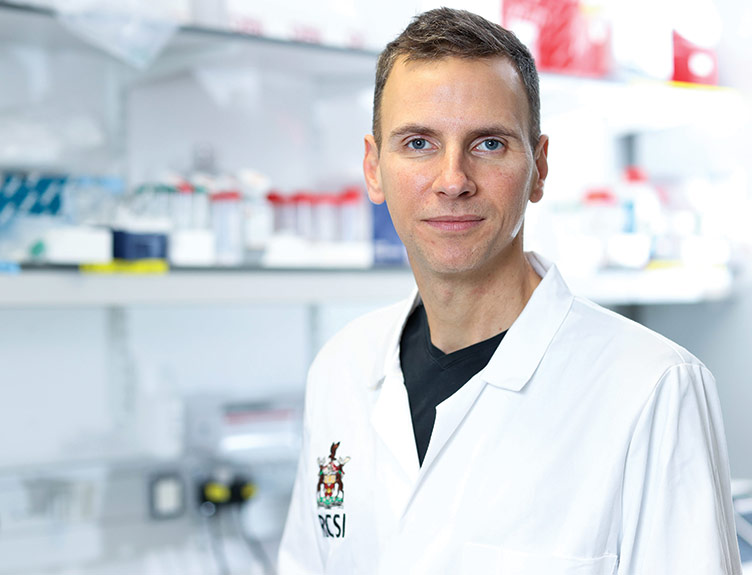RCSI researcher awarded €1.3 million European Research Council grant for ground-breaking research into diabetes

Dr Cathal Kearney from RCSI (Royal College of Surgeons in Ireland) Department of Anatomy and the Science Foundation Ireland funded AMBER (Advanced Materials and BioEngineering Research) centre has been awarded a €1.375 million European Research Council’s (ERC) Starter Grant for ground-breaking research to combat diabetic foot ulcers.
The highly prestigious grant supports researchers across Europe to set-up their own research teams and pursue potentially life-changing innovations. In total, 406 grants were awarded this year to projects across Europe with Dr Kearney receiving one of just two given to Irish institutions.
People with diabetes across the world are at risk of diabetic foot ulcers with up to a quarter of the 422 million diabetic population expected to suffer from the ailment in their lifetime. These wounds are very difficult to heal and are often prone to infection which can lead to amputation. It is estimated that every 30 seconds a limb is amputated as a result of a diabetic foot ulcer. In Ireland alone, 2,400 people were hospitalised in 2015 with the condition and 451 of these cases resulted in amputations.
Dr Cathal Kearney, Principal Investigator in the Tissue Engineering Research Group, RCSI received the funding for his research titled ‘BONDS: Bilayered ON-Demand Scaffolds for diabetic foot ulcers’. The goal of this research programme is to develop a new technology-driven device that will support the body’s own cells to grow new tissues to repair skin damage on the foot caused by ulcers. The device will be made of a sponge-like material and DNA will be delivered inside the device using a novel technology. The delivered DNA will then direct cells that enter the device to heal the wound.
Speaking about the funding, Dr Kearney said: “I am honoured to have been awarded this prestigious research grant from the ERC. In Ireland, it is estimated that €70 million/year is spent on the treatment of diabetic foot ulcers, with almost one in five cases resulting in amputation. This research has the potential to change that for the better for people with diabetes not only in Ireland but across the world.”
Director of Research and Innovation at RCSI, Professor Ray Stallings, welcomed the announcement saying: “This award to Dr Kearney is a testament to his stellar research in the area of biomaterials, and the expertise of RCSI’s Tissue Engineering Research Group that is addressing health issues arising from a range of chronic conditions such as diabetes. This innovation could transform the lives of diabetes patients across the world, and we look forward to seeing the outcomes of Dr Kearney’s work as his research expands as a result of this important grant.”
Dr Kearney has previously secured the prestigious Fullbright scholarship to attend MIT and Harvard University and the Marie Sklowdowska-Curie Fellowship at RCSI. His innovative work on drug delivery has been published in a number of high impact journals. Dr Kearney combines his research interests with a passion for teaching, having won the RCSI President’s Teaching Award 2017.
These coveted ERC Starter Grants support research in the life sciences, physical sciences and engineering, and social sciences and humanities and form part of the “Excellent Science” pillar of the European Union research and innovation programme, Horizon 2020.
Carlos Moedas, European Commissioner for Research, Science and Innovation, said: "Top talent needs good conditions at the right time to thrive. The EU provides the best possible conditions at the early stages of a researcher's career through the ERC Starting Grants. That's why this funding is so crucial for the future of Europe as a science hub: it keeps and attracts young talent. This time the ERC attracted researchers of 48 different nationalities based in 23 European countries. It's an investment that will pay off, boosting the EU's growth and innovation."
RCSI is ranked among the top 250 (top 2%) of universities worldwide in the Times Higher Education World University Rankings (2018). It is an international not-for-profit health sciences institution, with its headquarters in Dublin, focused on education and research to drive improvements in human health worldwide.



